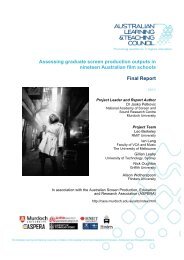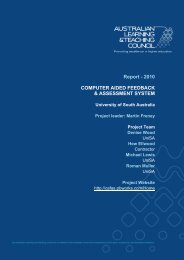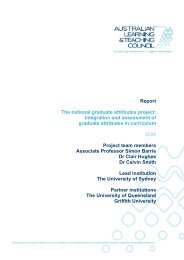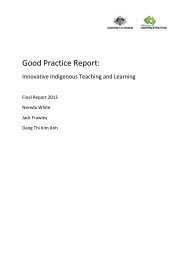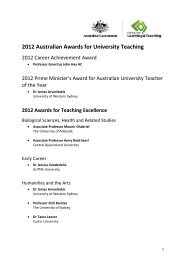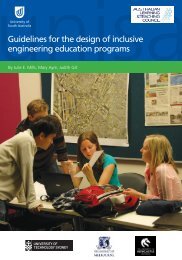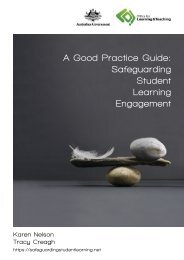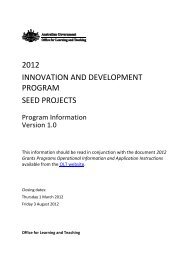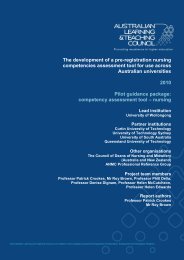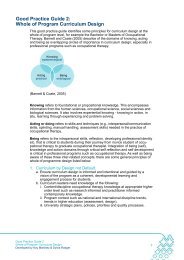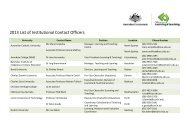Download Document - Office for Learning and Teaching
Download Document - Office for Learning and Teaching
Download Document - Office for Learning and Teaching
Create successful ePaper yourself
Turn your PDF publications into a flip-book with our unique Google optimized e-Paper software.
8 Guideline <strong>for</strong> International Students of Asian BackgroundStudying in Australian UniversitiesInternational students should be well prepared <strong>for</strong> studying in Australian universitiesbe<strong>for</strong>e they start their study in Australia. One important aspect is to an haveadequate level of English skills. While having satisfactory results in an English test(e.g., IELTS) is essential, it is only a starting point. Many other things need to beconsidered <strong>and</strong> implemented to better prepare them. For example, Asian students,especially Chinese students <strong>and</strong> others of non-English background (i.e., the officiallanguage of their country is not English) could have quite good English reading <strong>and</strong>writing skills but have poor listening <strong>and</strong> speaking skills, which can only be fullydeveloped in an English-speaking environment. They may still need a lot of practiceto improve their English, especially their speaking <strong>and</strong> listening abilities. On theother h<strong>and</strong>, students coming from Asian countries such as Malaysia, India,Singapore, Philippines <strong>and</strong> Hong Kong normally have better English skills(especially speaking <strong>and</strong> listening) than those students from non-English speakingcountries.Apart from language problems, our study finds that a significant difficulty <strong>for</strong>international students is the cultural shock. Most international students come from acultural background <strong>and</strong> education system which are significantly different fromAustralia’s. Becoming familiar with the Australian tertiary educational environment<strong>and</strong> the social environment could be a time-consuming <strong>and</strong> daunting task <strong>for</strong> manyinternational students. In addition, <strong>for</strong> some international students, feelings ofloneliness <strong>and</strong> helplessness, as well as homesickness, could dramatically distractthem from their studies in the beginning stage of their Australia life, especiallyundergraduate students, most of whom have never left their parents or countrybe<strong>for</strong>e.Asian international students also face many other challenges, such asunderst<strong>and</strong>ing <strong>and</strong> adapting to the Australian style of teaching <strong>and</strong> learning,becoming accustomed to Australian education management systems, <strong>and</strong> so on.To help Asian international students to quickly familiarise themselves <strong>and</strong> getcom<strong>for</strong>table with the new study environment in Australian universities, we havedeveloped this guideline to offer some useful advice to Asian international studentson tackling their language problem <strong>and</strong> culture shock issues, as well as otherlearning-related issues.The target readers of this guideline are Asian international students, especiallythose first year tertiary students of non-English speaking background. We also hopethat the guideline provides useful in<strong>for</strong>mation to those <strong>for</strong>eign students who arepreparing to study in Australian universities in the near future, as well as Asianinternational students who are currently studying in Australian secondary schools orcolleges.This guideline is divided into three sections: Accommodate yourself to the Australianeducation system, In classroom study skills <strong>and</strong> on campus study skills.8.1 Accommodate yourself to the Australian education systemBe<strong>for</strong>e arrival in AustraliaFind out as much as possible about Australia be<strong>for</strong>e you leave your home country. Ifyou can, talk to someone who has studied here be<strong>for</strong>e. With regard to English skills,you should keep in mind that passing the English test, such as IELTS, is not enough138



